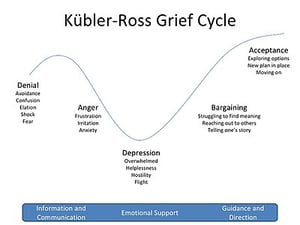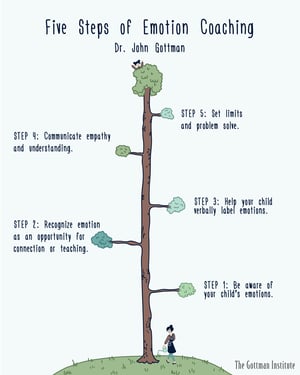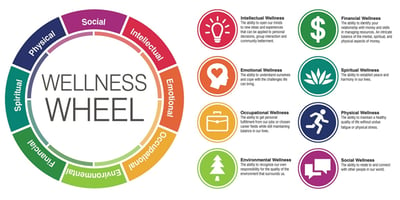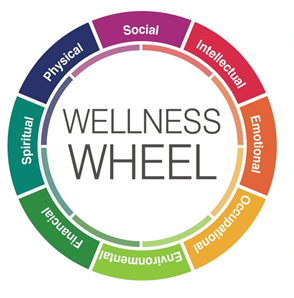Our Counselling Team at the Secondary School, Mr Ahmed, Ms Lee and Mr Slade, have written a couple of articles to help us make sense of what’s happening and how we’re feeling, with some tips and strategies to help us move from surviving to thriving during these challenging times.
The rollercoaster of life during the MCO and trying to make sense of it
Adjusting to life under the MCO can generate many challenges for parents, as we navigate our way through this uncertain period. This is a difficult time for many families, who may be experiencing high levels of anxiety, fear, uncertainty, anger, loss or sadness. It is important to acknowledge that these are very human emotions to feel when confronted with a situation of this scale. This can correlate with the ‘Grief Model’ developed by Elisabeth Kubler-Ross and David Kessler.

The five-stage grief model encompassing denial, anger, bargaining, sadness and acceptance may mirror some of the feelings people are experiencing during this time. This could be through a loss of normalcy, fear of economic toll or the loss of connection. The stages are not always linear, but it provides a reference for understanding and making sense of some of these emotions. A key stage of this model is ‘acceptance’ as we gradually adjust to this transient reality and our ability to seek meaning from our personal experiences.
Our sense of self-compassion is an integral part of our processing, healing and for coping in a healthy way. Be realistic in terms of the expectations that you place on yourself, there is often no ‘right or wrong’ way to be. The lockdown has also afforded us the space where we are able to reflect, assess or re-evaluate aspects of our lives. This can be conducive towards enhancing our relationships with others or defining the things we feel grateful for. As parents and children are facing major life disruptions, there are different protective factors helpful towards maintaining healthy emotional and mental wellbeing for families.

Normalising – It is helpful for parents to normalise feelings of anxiety that some teenagers may be experiencing. There is often the misconception that anxiety is a sign of mental illness, but psychologists have highlighted that anxiety is a normal and healthy function. Anxiety is a part of our biological makeup that alerts us to possible threats. In essence, it can be useful to validate the feelings of others and to provide reassurance or guidance for them.
Modelling – Children often learn from significant adults in their life on how to manage stress and to problem solve when things are difficult. If your child sees you panicking, being overly anxious or spiralling downwards, know that despite what they say, you are often their biggest influence. It is useful to convey a sense of calmness and emotional stability around children. This is also about displaying acts of affection through language or touch. This can be nourishing for children in helping them to feel secure, valued and is an important part of their emotional development and self-worth.
Structure – Children respond well to structure and particularly during stressful or overwhelming periods in their life. It is important to maintain a healthy robust routine for your child through embedding learning, social, play and family time. This provides a healthy and normative anchoring for children, offering a cohesive structure for them. It can also be empowering for children to be involved in the process of shaping their own timetables or routines. This is particularly pertinent when they feel a lack of control over other aspects of their life.
Allowing your child to feel their emotions – School closures have had an adverse impact on the lives of many children and particularly around the cancellation of many activities. Children will naturally be disappointed about ‘missing out’ and the sense of loss in terms of their social connections. In the context of an adolescent’s life, these can be major losses for them. It is helpful for their emotional development and resilience to acknowledge and to be with these emotions. We can pre-empt, support and validate some of the emotions that children are experiencing. Empathy can be a powerful tool in being able to connect meaningfully and understand the world from your child’s unique perspective.

Your self-care - It is important to be attentive towards your own needs as this helps to keep ourselves well, but also to ensure we are physically, emotionally, and mentally capable of being there for our children. It is useful to take some time to notice your own feelings and reflect before responding to your child. If you are feeling anxious or angry, find a helpful distraction or do some box breathing exercises to help with regulation and feeling calmer. Make a plan and write down some of the activities that make you feel happy and help to reduce your stress level. The MCO has presented a challenge to maintaining self-care, but look at some creative ways in how you can incorporate this at home. Take the time to look at what works for you and find healthy conduits to express some of these emotions.
The counselling service continues to support students and families especially during this period of uncertainty. We have a supportive GSite for students, staff and parents to access with a dedicated section on coping with Covid_19.



